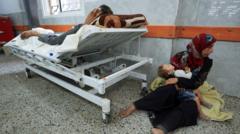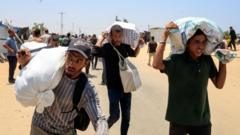In the wake of a catastrophic earthquake on March 28, Myanmar battles extensive destruction while international relief efforts are impeded by bureaucratic hurdles and fear of military reprisals.
Disaster Strikes Myanmar: Earthquake Relief Efforts Hampered by Government Delays

Disaster Strikes Myanmar: Earthquake Relief Efforts Hampered by Government Delays
Aid organizations claim Myanmar's military regime is obstructing humanitarian assistance following a devastating earthquake.
As rubble envelops Naypyidaw, the country faces significant challenges in recovery, with many left destitute following the quake that has left over 3,500 people confirmed dead.
The powerful earthquake that rocked the nation last month has worsened the humanitarian crisis in Myanmar, a country already strained by ongoing civil conflict. International calls for help have met with daunting obstacles, including a pronounced delay in aid distribution attributed to the military junta's tight control over relief efforts. Volunteers rushing to assist from around the globe found themselves gridlocked at immigration upon arrival in Yangon, ultimately disappointing hopes of finding survivors.
French aid workers who previously saved lives with advanced radar in earthquake-ridden Turkey encountered disappointments during their mission in Myanmar. After enduring a protracted wait at the airport, they were met with an abrupt announcement that search and rescue operations would conclude just a day later, forcing their return home empty-handed.
While the military government’s surprising decision to invite international assistance signaled an unexpected shift, on-ground reality reflects continued hostility, with reports of renewed airstrikes against opposition forces and attacks on aid workers. The situation presents stark contradictions, as Myanmar endeavors for a cease-fire amidst an environment shrouded in fear and skepticism.
Rescue efforts are further complicated by the sheer scale of the disaster; officials confirm the death toll exceeds 3,500, but the extent of the total damage remains difficult to evaluate due to torn-up roads and disrupted communication networks. As Myanmar grapples with its escalating crisis, calls for transparent and efficient aid delivery grow louder, emphasizing the urgent need for a humanitarian response that transcends bureaucratic obstacles inherent in a militarized state.
The powerful earthquake that rocked the nation last month has worsened the humanitarian crisis in Myanmar, a country already strained by ongoing civil conflict. International calls for help have met with daunting obstacles, including a pronounced delay in aid distribution attributed to the military junta's tight control over relief efforts. Volunteers rushing to assist from around the globe found themselves gridlocked at immigration upon arrival in Yangon, ultimately disappointing hopes of finding survivors.
French aid workers who previously saved lives with advanced radar in earthquake-ridden Turkey encountered disappointments during their mission in Myanmar. After enduring a protracted wait at the airport, they were met with an abrupt announcement that search and rescue operations would conclude just a day later, forcing their return home empty-handed.
While the military government’s surprising decision to invite international assistance signaled an unexpected shift, on-ground reality reflects continued hostility, with reports of renewed airstrikes against opposition forces and attacks on aid workers. The situation presents stark contradictions, as Myanmar endeavors for a cease-fire amidst an environment shrouded in fear and skepticism.
Rescue efforts are further complicated by the sheer scale of the disaster; officials confirm the death toll exceeds 3,500, but the extent of the total damage remains difficult to evaluate due to torn-up roads and disrupted communication networks. As Myanmar grapples with its escalating crisis, calls for transparent and efficient aid delivery grow louder, emphasizing the urgent need for a humanitarian response that transcends bureaucratic obstacles inherent in a militarized state.





















